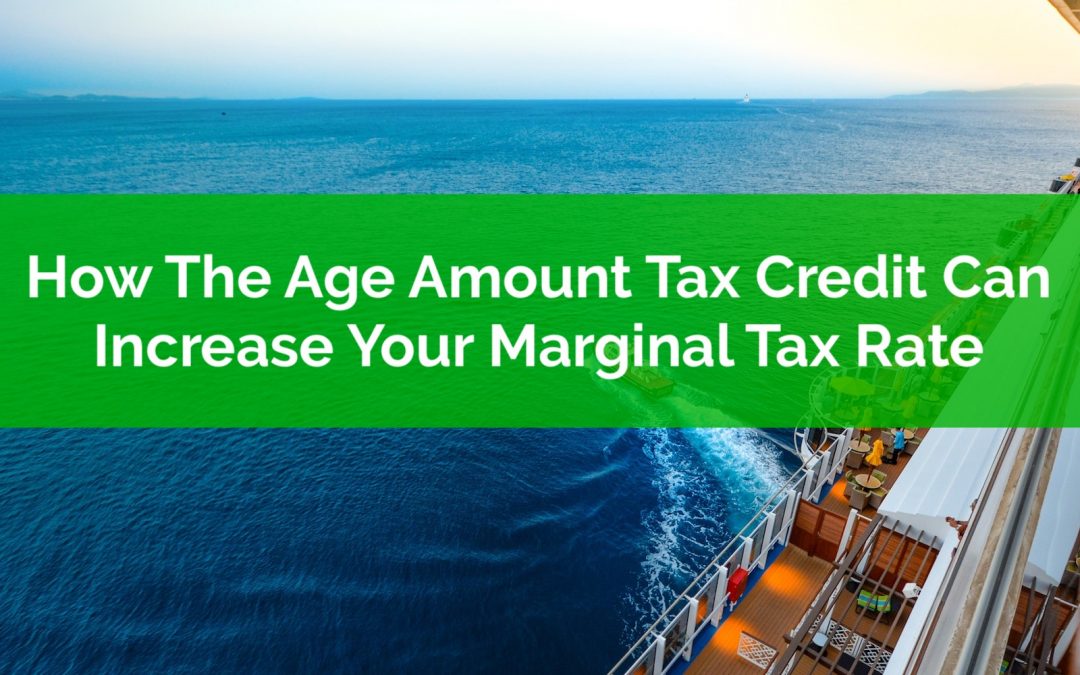
by Owen | May 3, 2021 | Financial Planning, Retirement Planning, Tax Planning
Marginal tax rates are important. The represent the income tax you pay on the next dollar of income. Knowing your marginal tax rate both now and in the future can be extremely helpful when doing tax planning.
One tax planning opportunity is to make an RRSP contribution in a high tax bracket and withdraw later in a lower tax bracket. This opportunity can help defer tax until retirement when RRSP withdrawals are made at a lower tax rate. Ideally, an RRSP contribution allows you to contribute at a high marginal tax rate and withdraw at a lower marginal tax rate in the future.
This difference in tax rates can lead to a lot of tax savings. Contribute at a 40% tax rate now and withdraw at a 20% or 30% tax rate in the future and for every $1,000 that goes into an RRSP there is $100 to $200 in tax savings over a lifetime. Expand that to tens or hundreds of thousands of dollars of contribution and you can begin to see the incredible opportunity that a bit of tax planning can create.
But what if your marginal tax rate in retirement isn’t quite what you think it will be? What if its higher than you think? What if the typical marginal tax rate tables are missing something? You might be underestimating your future marginal tax rate in retirement.
In this post we’re going to explore a tax credit called the Age Amount and in particular the way that the Age Amount is reduced (or clawed back) based on income in retirement.
We’re also going to explore how this may affect your marginal tax rate in retirement. As we’ll see, the marginal tax rate you’re planning for may not be the marginal tax rate you actually experience in retirement.

by Owen | Apr 26, 2021 | Financial Planning, Insurance And Risk Management, Investment Planning, Retirement Planning
If we knew how things would unfold in the future, then financial planning would be easy.
If we knew things like future investment returns and future inflation rates, then that would remove a lot of uncertainty in a financial plan.
If we also knew when we’re going to die, then we could make sure that we spend every penny and “bounce the last check”.
But because of all the unknowns, we have a lot of uncertainty within a financial plan. To create a great financial plan, we have to evaluate and plan for that uncertainty. We have to understand both the average and the extremes. We don’t want to run out of money in the future, so it’s important that we manage this uncertainty properly and avoid making bad assumptions.
Life expectancy is one of those assumptions and it’s a big assumption within a financial plan. Assume a life expectancy that is too short and there could be years (or possibly decades) of meager retirement income.
When it comes to life expectancy, we can’t just assume the average, we need to know how much longer our money needs to last. Is it 5-years past the average, 10-years, 20-years, or more? Hopefully it’s for a very long time.

by Owen | Apr 19, 2021 | Behavioral Finance, Buying A Home, Financial Planning
Credit reporting has turned into a multi-billion-dollar business but getting your credit report doesn’t have to be expensive, in fact, you can get a free credit report mailed to you once per year and all it takes is just 5-minutes.
A credit report represents all your recent credit history, mortgages, credit cards, vehicle loans, lines of credit, and even some bill payments. It’s often referred to as a “consumer disclosure” or “credit file disclosure” but most people call it a credit report.
Every piece of debt you’ve recently owned (even if paid off or closed) should be represented on your credit report. It will also capture your current and past addresses, phone numbers, even employers.
In today’s world your credit report is very important. It directly impacts your ability to qualify for new debt. Plus, it often gets pull as part of a thorough background check. It can also help identify fraud and identity theft early on, limiting the damage.
Your credit report is so important that it’s a good idea to check and review it on a regular basis.

by Owen | Apr 12, 2021 | Financial Planning, Investment Planning, Tax Planning
Getting married is a big step in a relationship. It often means changes to personal finances. Some of these changes can be quite positive. These changes can actually make it much, much easier to achieve financial goals.
In this post we’ll explore the financial benefits of marriage (or entering a common-law relationship).
There are obviously a lot of considerations when combining finances, but there are certain financial advantages that couples have versus individuals. These advantages can make it easier to achieve financial goals. There are tax advantages, saving advantages, spending advantages, debt advantages, and risk reduction advantages.
If you’ve recently entered into a common-law relationship, or if you’ve recently gotten married, then you might be interested to know the financial benefits of marriage.

by Owen | Apr 5, 2021 | Financial Goals, Financial Planning, Retirement Planning
What is advice-only financial planning exactly? What does advice-only financial planning entail?
Also known as fee-for-service financial planning, advice-only financial planning involves no products, no commissions, just advice.
With traditional forms of financial advice, there is always the nagging doubt about whether the advice is truly unbiased or if is it just to sell a product and receive a commission? There is always that lingering question, is this advice really in your best interest or is it in the best interest of the advisor?
Advice-only financial planning eliminates this conflict of interest. An advice-only financial planner is compensated directly by the client and only the client. There are no products, no commissions, just pure advice.
An advice-only financial planner works for the client to provide the best advice possible and good financial advice can be extremely helpful. It can reduce stress, provide peace of mind, capture unseen opportunities, avoid unnecessary risks etc. etc.
There are many different ways to receive financial advice, but one of the most unbiased and trustworthy is advice-only financial planning.
Let’s go deeper into exactly what advice-only financial planning is and why, in today’s world of low-cost self-directed investing, it makes more sense than ever to get an advice-only financial plan…

by Owen | Mar 15, 2021 | Buying A Home, Financial Planning, Government Programs, Investment Planning, Saving Money
The global pandemic has impacted all of us differently, our personal finances have gone through many changes and some have “weathered the storm” better than others.
FP Canada, the board that governs the Certified Financial Planner (CFP) designation in Canada, recently came out with a survey called “The Tale Of Two Pandemics” and it highlights both the positive and the negative impact that the pandemic has had on our personal finances (more details on the survey results at the end of this post).
There are some troubling stats within the survey, for example 14% of those in Ontario have been forced out of the labor market, 21% have seen an increase in expenses, and 14% have seen a reduction in work hours/income.
But the survey also highlights the opposite side of the pandemic, many people have not experienced a job loss, or a reduction in income, or an increase in expenses over the course of the pandemic.
In fact, looking at the statistics, it looks like there is a large group of people that have not been affected by the pandemic at all, and another group of people who have actually benefited financially from the pandemic.
This is consistent with the conversations we’re having with clients.
For those who have been fortunate enough to remain gainfully employed, for those who own a home or recently purchased a home, for those with a mortgage or other debt like student loans or HELOCs, and for those who are investing on a regular basis, the pandemic has actually improved their personal finances in a number of ways.
The pandemic has impacted us all differently, but for many people there have been one, two, three or more positive changes that may have actually improved their personal finances. As it turns out, this is especially true for those who had a financial plan already in place.
Here are some ways that a person’s personal finances may have improved during the pandemic…
Page 11 of 19«...910111213...»






